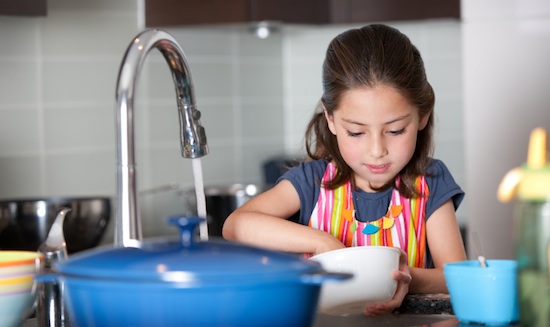Organization at a young age is critical. Just as a messy desk can cause you to feel overwhelmed, when your children are surrounded by disorganization, they often become mentally over-stimulated, and that feeling can then manifest in behavioral issues at home and at school.
But kids are just innately messy, right? Wrong! The fact of the matter is that messy children are not born. They are created. Maybe as a parent, you do your cleaning after they’ve gone to bed or when they’re not at home, so they haven’t had the opportunity to actually see the process in action. In addition to your not showing them, perhaps you haven’t taken the time to teach them (kids are definitely not born knowing how to dust!) or, as with every new skill, they simply need practice to get the hang of it.
Bottom line, you can raise a child who wants to keep his room clean.
Start early.
Because about 90 percent of brain development happens in the first five years of life, take advantage of that highly receptive period to begin teaching your children about cleaning. In fact, age two or three is ideal. My 6-year-old daughter has been dusting since she was about three, and started sweeping when she was five. She now loves doing both, and does them without being told. (Really!) How do you teach a child that young to clean up after himself or herself? Try making it fun by using games like hide-and-seek. Start by hiding a toy or a hat where it’s not supposed to be. Challenge your kids to find it and put it back in its proper place. Next time, let them hide something from you.
A pat on the back goes a long way.
Everyone likes to be told they’ve done something right. Praise like: “That’s amazing how you’ve organized your video games!” or “I’ve never seen a closet as clean as this one!” (Avoid backhanded compliments like, “Wow, I can see the floor again!”) When your children feel good about what they’ve done, they’re more likely to try to do it the same way again.
Reinforce with tangible rewards.
While the most effective way to teach good habits is through consistent verbal praise, high fives, and hugs, sometimes it’s a good idea to pair the emotional rewards with tangible ones, like a weekly allowance, a monthly shopping trip, or tickets to an event. However, when you offer a monetary reward like this, be sure to tie it directly to a specific chore, like keeping their rooms clean, emptying the dishwasher twice a week, or sweeping the porch every Saturday, to teach them the concept of earning their keep. That lesson will serve them well down the road.
Don’t do it for them.
When you clean up for your children, you’re teaching them that their things will magically go back to where they belong when they go to bed at night or when they’re off at school all day. That’s not a lesson we want kids to learn! Give a kid a clean room and maybe it’ll be clean for a day. Teach him to clean his room himself, and that skill will be his for a lifetime.
Be consistent.
My most important advice in reinforcing these new behaviors is to be consistent and persistent with the teaching, rewarding, and praising. Rome wasn’t built in a day and neither are fastidious children. After a while, your kids will not only be better at keeping their rooms, desks, and lockers clean and organized, but these tasks will start to feel less like drudgery and more like a part of their everyday life. When a spick-and-span room is a source of pride and satisfaction for them, then you know your job is done.




